

Poster-starts-with-dream810-copy.jpg (960×753) Common Mistakes Made By Social Entrepreneurs. Damascus Fortune - Home. GSMA mWomen Design Challenge. The making of sanitary napkins at the Barefoot College. Unreasonable Institute Marketplace: Greenway Grameen Infra. What is the urgent social or environmental need you are addressing?
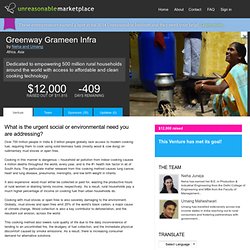
Over 700 million people in India & 3 billion people globally lack access to modern cooking fuel, requiring them to cook using solid biomass fuels (mostly wood & cow dung) on rudimentary mud stoves or open fires. Cooking in this manner is dangerous – household air pollution from indoor cooking causes 4 million deaths throughout the world, every year, and is the #1 health risk factor in all of South Asia. The particulate matter released from this cooking method causes lung cancer, heart and lung disease, pneumonia, meningitis, and low birth weight in infants. It also expensive: wood must either be collected or paid for, wasting the productive hours of rural women or draining family income, respectively. As a result, rural households pay a much higher percentage of income on cooking fuel than urban households do. Cooking with mud stoves or open fires is also severely damaging to the environment. Convince us it will work.
Unreasonable Institute Marketplace: MPrep. What is the urgent social or environmental need you are addressing?
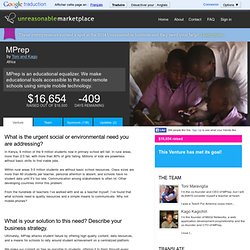
In Kenya, 6 million of the 9 million students now in primary school will fail. In rural areas, more than 2/3 fail, with more than 80% of girls failing. Millions of kids are powerless without basic skills to find viable jobs. Within rural areas 3-5 million students are without basic school resources. Class sizes are more than 60 students per teacher, personal attention is absent, and schools have no student data until it’s too late. Unreasonable Institute Marketplace: Chaupal. What is the urgent social or environmental need you are addressing?
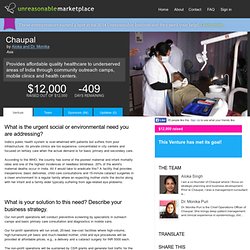
India’s public health system is over-whelmed with patients but suffers from poor infrastructure. Its private clinics are too expensive, concentrated in city centers and focused on tertiary care when the actual demand is for basic primary and secondary care. According to the WHO, the country has some of the poorest maternal and infant mortality rates and one of the highest incidences of needless blindness. 20% of the world’s maternal deaths occur in India. Unreasonable Institute Marketplace: Trash to Cash. What is the urgent social or environmental need you are addressing?
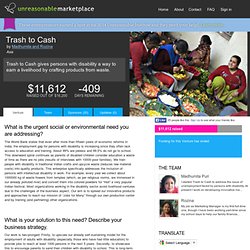
The World Bank states that even after more than fifteen years of economic reforms in India, the employment gap for persons with disability is increasing since they often lack access to education and training. About 99% are jobless and 99.5% do not go to school. 74 For-Profit Purpose Organizations - From Sustainable Plant Systems to Market Poverty Initiatives. 77 Social Businesses in India - From Technological Irrigation Systems to Tax-Deductible Travel. These social businesses in India prove more to the claim that the country is steadily emerging as a hot bed in the ever growing sphere of social entrepreneurship.
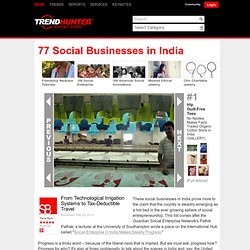
This list comes after the Guardian Social Enterprise Network's Pathik Pathak, a lecturer at the University of Southampton wrote a piece on the International Hub called "Social Enterprise in India Makes Steady Progress. " Progress is a tricky word -- because of the liberal-ness that is implied. But we must ask: progress how? Progress for who? It's also at times problematic to talk about the scenes in India and, say, the United Kingdom as two entirely separate ecosystems.
Lessons from a Failed Social Entrepreneur - Mike McGlade. Mission. Nest is a nonprofit dedicated to identifying and collaborating with responsible artisan businesses through implementation of training and business development.
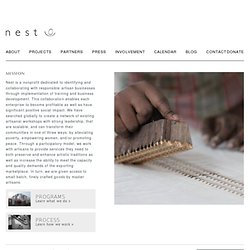
This collaboration enables each enterprise to become profitable as well as have significant positive social impact. We have searched globally to create a network of existing artisanal workshops with strong leadership, that are scalable, and can transform their communities in one of three ways: by alleviating poverty, empowering women, and/or promoting peace. Through a participatory model, we work with artisans to provide services they need to both preserve and enhance artistic traditions as well as increase the ability to meet the capacity and quality demands of the exporting marketplace.
In turn, we are given access to small batch, finely crafted goods by master artisans. Programs Learn what we do »Process Learn how we work » Team. Pearltrees Extension. Socialsync.in. Social Innovation Hub (Beta) Social Innovation Hub: Builds a support network for social entrepreneurs with a vision to right a wrongSpawns a rich culture of ideas exchange between the like-mindedFacilitates meaningful partnerships among people willing to work on similar ideasPools information and opportunities to build a collective resource reservoirCreates meaningful connections that are sustained beyond events or publications.
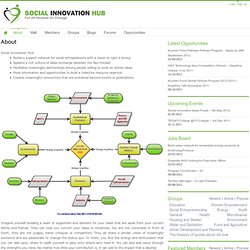
Bandhan :Philosophy. Mumbai Mentors. Shaheen Mistri was an 18 year-old American on vacation in India, when she came face-to-face with a level of despair that changed her life.
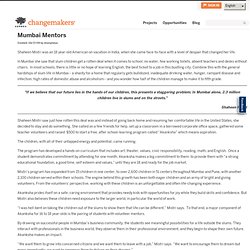
In Mumbai she saw that slum children get a rotten deal when it comes to school; no water, few working toilets, absent teachers and desks without chairs. In most schools, there is little or no hope of learning English, the best ticket to a job in this bustling city. Combine this with the general hardships of slum life in Mumbai-- a shanty for a home that regularly gets bulldozed, inadequate drinking water, hunger, rampant disease and infection, high rates of domestic abuse and alcoholism-- and you wonder how half of the children manage to make it to fifth grade. "If we believe that our future lies in the hands of our children, this presents a staggering problem; In Mumbai alone, 2.3 million children live in slums and on the streets.” Shaheen Mistri The children, with all of their untapped energy and potential, came running.
Biofuels. Biofuels, like biodiesel and bioethanol, are derived from biomass (plants and other organic wastes) and they provide a safe and sustainable alternative to using fossil fuels to power vehicles and machinery.
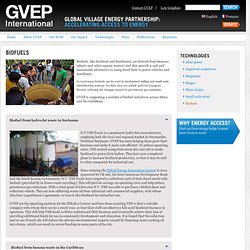
In rural areas biofuels can be used in mechanised milling and small scale electrification systems. In cities, they are widely used for transport, thereby reducing the damage caused by greenhouse gas emissions. GVEP is supporting a number of biofuel initiatives across Africa and the Caribbean. Biofuel from hydro-fat waste in Suriname N.V.VSH Foods is a prominent hydro-fats manufacturer, supplying both the local and regional market in Paramaribo, Northern Suriname. Since winning the IDEAS Energy Innovation Contest in 2012 sponsored by UK Aid, the Inter-American Development Bank and the South Korean Government; N.V.
Biofuel from banana waste in the Caribbean A new power plant in the Caribbean island of St Lucia, will use banana waste to produce methane via biodigesters.